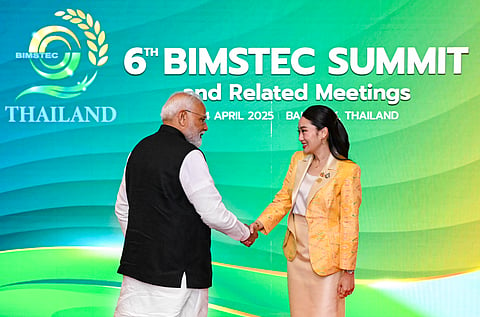

NEW DELHI: Prime Minister Narendra Modi said on Friday that BIMSTEC is a model for inclusive development and collective security, while unveiling a 21-point action plan to expand the grouping's scope during its 6th annual summit in Bangkok.
During the summit, the seven-member grouping of Bay of Bengal littoral and adjacent countries that account for 22 per cent of world population signed an agreement on maritime transport cooperation to strengthen maritime connectivity between South and Southeast Asia, improve logistical efficiency, reduce trade costs, and enhance the movement of goods and people besides unveiling a vision document for their future cooperation.
“For us, BIMSTEC is not merely a regional organization. It is a model for inclusive development and collective security. It stands as a testament to our shared commitments and the strength of our unity,” Modi said in his statement at the summit.
Stating that the grouping embodies the spirit of “Sabka Saath, Sabka Vikas, Sabka Prayas”, Modi expressed confidence that together the countries will continue to strengthen the spirit of solidarity, cooperation, and mutual trust, and take BIMSTEC to even greater heights.
“To further strengthen BIMSTEC, we must continue to expand its scope and enhance its institutional capacities,” Modi said as he announced a 21-point action plan to expand the cooperation of the grouping in a host of areas from maritime cooperation to disaster management, from digital connectivity to space cooperation.
Modi proposed to establish connectivity between India’s Unified Payments Interface (UPI) and the payment systems of BIMSTEC member states, which would offer significant benefits across trade, industry, and tourism, thereby boosting economic activity at all levels.
He also proposed the establishment of a ground station for manpower training, the development and launch of nano-satellites, and use of remote sensing data for the BIMSTEC countries.
Stating that public health is a vital pillar of collective social development, Modi announced that India would extend support for training and capacity building in cancer care across BIMSTEC countries. “In line with our holistic approach to health, a Centre of Excellence will also be established to promote research and dissemination of traditional medicine,” Modi said.
As the host, Thailand Prime Minister Paetongtarn Shinawatra announced the signing of six documents at the conclusion of the summit in Bangkok.
Leaders of the member states approved the BIMSTEC Bangkok Vision 2030 during the summit, a key initiative aimed at enhancing economic integration, connectivity, and human security, with a strategic plan to establish a prosperous, resilient, and open "PRO BIMSTEC" by 2030.
The 6th BIMSTEC Summit Declaration and the Rules of Procedure for BIMSTEC Mechanisms were also adopted, reaffirming the commitment of member countries and establishing a more systematic, rules-based framework for BIMSTEC operations to ensure greater efficiency and consistency.
The report of the BIMSTEC Eminent Persons' Group on the Future Direction of BIMSTEC was unveiled, offering key recommendations aligned with the BIMSTEC Bangkok Vision 2030.
“We also witnessed the signing of the Agreement on Maritime Transport Cooperation, which will strengthen maritime connectivity between South and Southeast Asia, enhance logistical efficiency, reduce trade costs, and improve the movement of goods and people,” said Paetongtarn.